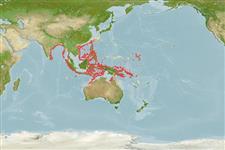Common names from other countries
>
Scombriformes (Mackerels) >
Scombridae (Mackerels, tunas, bonitos) > Scombrinae
Etymology: Rastrelliger: Latin, rastra = rake + Latin, gero = to carry.
Environment: milieu / climate zone / depth range / distribution range
Ökologie
seewasser; ozeanodrom (Ref. 51243); tiefenbereich 2 - 150 m (Ref. 128967). Tropical; 26°N - 14°S, 78°E - 157°E (Ref. 168)
Indo-West Pacific: India to Fiji, north to Taiwan.
Size / Gewicht / Alter
Maturity: Lm ? range ? - ? cm
Max length : 20.0 cm FL Männchen/unbestimmt; (Ref. 168); max. veröff. Gewicht: 750.00 g (Ref. 168)
Rückenflossenstacheln (insgesamt): 8 - 11; Rückenflossenweichstrahlen (insgesamt): 12; Afterflossenstacheln 0; Afterflossenweichstrahlen: 12; Wirbelzahl: 31. Head longer than body depth. Maxilla covered by lachrymal bone. Swim bladder present. Interpelvic process small and single. Anal spine rudimentary. Bristles on longest gill raker, 30 to 55 on one side. Gill rakers do not extend far into mouth. A black blotch behind pectoral fin base. The belly is yellowish silver; 2 to 6 large spots are at the base of the first dorsal fin; tow faint stripes are at the level of the lateral line in some specimens.
Epipelagic, neritic species, occurring in waters where surface temperatures do not fall below 17°C. Forms schools of equally sized individuals. Feeds on the largest zooplankton organisms, thus complementing the planktonic food spectrum of the other two Rastrelliger species.
Life cycle and mating behavior
Geschlechtsreife | Fortpflanzung | Ablaichen | Eier | Fecundity | Larven
Collette, B.B. and C.E. Nauen, 1983. FAO Species Catalogue. Vol. 2. Scombrids of the world. An annotated and illustrated catalogue of tunas, mackerels, bonitos and related species known to date. Rome: FAO. FAO Fish. Synop. 125(2):137 p. (Ref. 168)
IUCN Rote Liste Status (Ref. 130435)
CITES (Ref. 128078)
Not Evaluated
Bedrohung für Menschen
Harmless
Nutzung durch Menschen
Fischereien: kommerziell; Sportfisch: ja
Mehr Information
NamenSynonymeMetabolismusRäuberÖkotoxikologieFortpflanzungGeschlechtsreifeAblaichenFecundityEierEientwicklung
ReferenzenAquakulturAquakultur ProfilZuchtlinienGenetikElectrophoresesVererbbarkeitKrankheitenVerarbeitungMass conversion
PartnerBilderStamps, Coins Misc.LauteCiguateraGeschwindigkeitSchwimmstilKiemenoberflächeOtolithsGehirngrößeSehfähigkeit
Tools
Zusatzinformationen
Download XML
Internet Quellen
Estimates based on models
Preferred temperature (Ref.
115969): 15 - 22.9, mean 18.3 (based on 44 cells).
Phylogenetic diversity index (Ref.
82804): PD
50 = 0.6250 [Uniqueness, from 0.5 = low to 2.0 = high].
Bayesian length-weight: a=0.00912 (0.00538 - 0.01546), b=3.04 (2.90 - 3.18), in cm Total Length, based on LWR estimates for this species & (Sub)family-body (Ref.
93245).
Trophic level (Ref.
69278): 3.4 ±0.45 se; based on food items.
Widerstandsfähigkeit (Ref.
120179): hoch, Verdopplung der Population dauert weniger als 15 Monate. (K=1.45).
Fishing Vulnerability (Ref.
59153): Low vulnerability (11 of 100).
